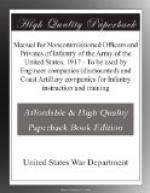25. In order to give ample notice, first sergeants will, when practicable, publish at retreat and post on the company bulletin board all details made from the company for duties to be performed.
26. Where rosters are required to be kept by this manual, all details will be made by roster.
SECTION 4. COMMANDER OF THE GUARD.
41. The commander of the guard is responsible for the instruction and discipline of the guard. He will see that all of its members are correctly instructed in their orders and duties and that they understand and properly perform them. He will visit each relief at least once while it is on post, and at least one of these visits will be made between 12 o’clock midnight and daylight.
42. He receives and obeys the orders of the commanding officer and the officer of the day, and reports to the latter without delay all orders to the guard not received from the officer of the day; he transmits to his successor all material instructions and information relating to his duties.
43. He is responsible under the officer of the day for the general safety of the post or camp as soon as the old guard marches away from the guardhouse. In case of emergency, while both guards are at the guardhouse, the senior commander of the two guards will be responsible that the proper action is taken.
44. Officers of the guard will remain constantly with their guards, except while visiting patrols or necessarily engaged elsewhere in the performance of their duties. The commanding officer will allow a reasonable time for meals.
45. A commander of a guard leaving his post for any purpose will inform the next in command of his destination and probable time of return.
46. Except in emergencies, the commander of the guard may divide the night with the next in command, but retains his responsibility; the one on watch must be constantly on the alert.
47. When any alarm is raised in camp or garrison, the guard will be informed immediately. (Par, 234.) If the case be serious, the proper call will be sounded, and the commander of the guard will cause the commanding officer and the officer of the day to be at once notified.
48. If a sentinel calls: “The guard,” the commander of the guard will at once send a patrol to the sentinel’s post. If the danger be great, in which case the sentinel will discharge his piece, the patrol will be as strong as possible.
49. When practicable, there should always be an officer or noncommissioned officer and two privates of the guard at the guardhouse in addition to the sentinels there on post.




